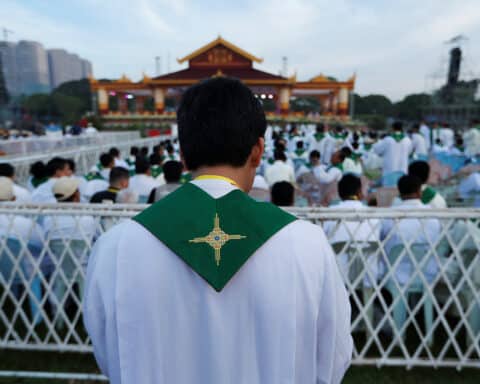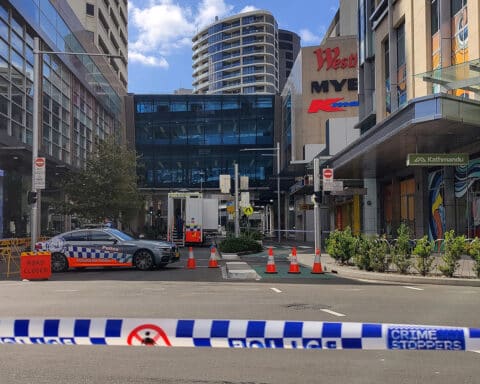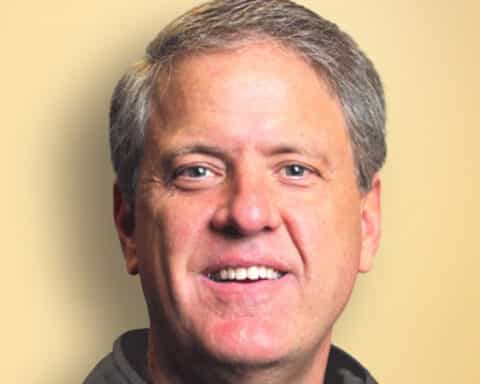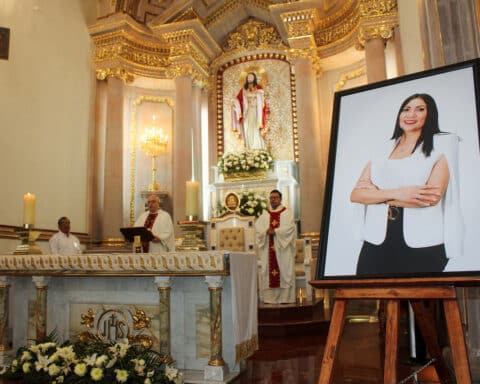The nation’s Catholic bishops are calling on the faithful to increased “prayer and sacrifice” in response to the most recent wave of mass shootings that left 31 people dead and dozens of others wounded in El Paso, Texas, and Dayton, Ohio.
But exactly how best to end gun violence remains a pointed topic of disagreement among Catholics, with some saying that gun control will not stop the killing and others arguing that the United States leads the developed world in fatal shootings because of the general public’s accessibility to firearms.
“I don’t think it’s an either/or problem. I think it’s a both/and problem,” said Tobias Winright, a former police officer who is now a moral theologian at Saint Louis University.
Winright, who believes that the public’s ability to obtain powerful semi-automatic weapons such as the AR-15 increases the probability of mass shootings, told Our Sunday Visitor that recent public opinion polling shows a growing concern with gun violence.
“I don’t know if it’s tipped the scales yet, but I think we’re moving there, if we haven’t gotten there yet,” Winright said.
On Aug. 3, a man opened fire inside a Walmart, killing 22 people and injuring 26 others in El Paso. Less than 24 hours later, a gunman killed nine people and wounded 27 others outside a bar in Dayton.
Schools of thought
Following the incidents, a few individual bishops, including Cardinals Blase Cupich of Chicago and Joseph Tobin of Newark, issued strongly worded statements calling for an end to gun violence. Cardinal Tobin even called on lawmakers to enact legislation requiring universal background checks for all gun purchases and to ban the sale or possession of “all assault weapons.”
Since the 1970s, the U.S. Conference of Catholic Bishops has issued several statements favoring strong gun-control measures. The bishops even hoped for the “eventual elimination” of guns from American society in the 1990 USCCB document “New Slavery, New Freedom: A Pastoral Message on Substance Abuse.”
In its own statements following the shootings in El Paso and Dayton, the bishops’ conference called for “needed changes to our national policy and national culture,” noting that the conference has “long advocated” for responsible gun laws and increased resources to address the root causes of violence.
“The bishops have long been speaking out about this and working really hard, as a witness to life, the common good and Catholic teaching, that there needs to be some sort of reasonable regulations on gun ownership,” Therese Lysaught, a theologian and bioethicist at Loyola University Chicago, told OSV.
However, other Church leaders took the opportunity to point to a more cultural problem. Philadelphia Archbishop Charles J. Chaput, who as the former archbishop of Denver buried some of the victims in the 1999 shooting at Columbine High School, said that experience taught him that “only a fool” can believe gun control will solve the problem of mass violence.
“The people using the guns in these loathsome incidents are moral agents with twisted hearts. And the twisting is done by the culture of sexual anarchy, personal excess, political hatreds, intellectual dishonesty, and perverted freedoms that we’ve systematically created over the past half-century,” Archbishop Chaput wrote Aug. 5 in his column for CatholicPhilly.com, the online newspaper for the Archdiocese of Philadelphia.
On Twitter, Bishop Joseph Strickland of Tyler, Texas, posted Archbishop Chaput’s column, and added that the “Light of the Gospel” was “the only true remedy” to the culture of death that Pope St. John Paul II spoke about during his pontificate.
Bishop Mark Seitz of El Paso spoke directly to reports that the alleged gunman in the El Paso attack was a white nationalist who had written a manifesto decrying the “Hispanic invasion of Texas,” which echoes rhetoric that some have used to refer to migrants on the U.S.-Mexico border.
“Once again in our nation we see the face of evil. We see the effects of a mind possessed by hatred. We see the effects of the sinful and insipid conviction that some of us are better than others of us because of race, religion, language or nationality,” he said in a prepared statement.
The El Paso shooter’s connection to white nationalism, a growing domestic threat that has contributed to other recent mass shootings in the United States and abroad, spurred other bishops to decry racism and “the culture of hate” that they warn has become resurgent.
“We must work toward a more civil and just society that rejects all forms of violence and hatred in our country. The fabric of our national conscience is at risk,” Cardinal Seán P. O’Malley, the archbishop of Boston, said in a prepared statement.
The FBI said that the Dayton shooter had explored “violent ideologies” and expressed a desire to commit a mass shooting, but didn’t say which ideologies or give a possible motive, though there has been speculation on social media.
Change is needed
Maureen O’Connell, the chairwoman for the Department of Religion at LaSalle University in Philadelphia, who has studied gun violence, said that there is a need to be careful about framing gun violence in terms of evil in the human heart.
“That could make gun violence seem super-human and therefore beyond our human capacity to change. What’s going on is really the result of collective human choices and human inaction,” said O’Connell, who also warned of the risk of American society reaching a place where gun violence is tolerated.
“I think we need more critical thinking, a bit more nuance, and I think we have to start bringing elements of our Catholic intellectual tradition to bear on that a bit more,” she said.
Winright, of St. Louis University, said the issue of gun violence has been receiving more attention among moral theologians, many of whom he said are asking why it has not been more of a pressing matter until recently.
“This is something we should have addressed long ago,” Winright said. “I mean, if not now, when?”
Brian Fraga is contributing editor for Our Sunday Visitor.
| U.S. bishops’ measures to address gun violence |
|---|
|
For many years the USCCB has supported a number of reasonable measures to address the problem of gun violence. These include:
— Source: Backgrounder on a Mercy and Peacebuilding Approach to Gun Violence (USCCB) |





